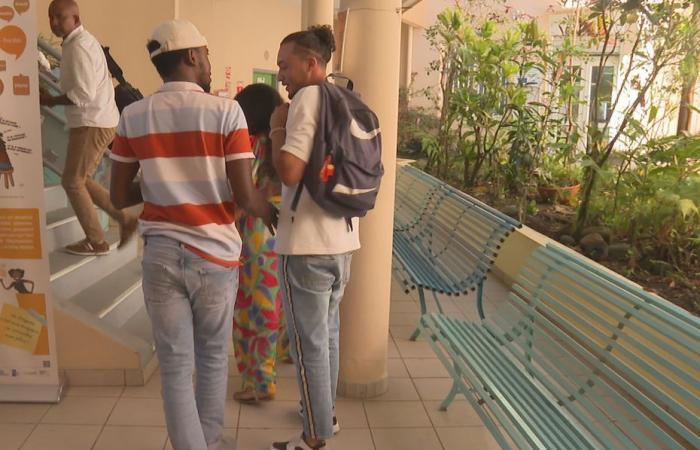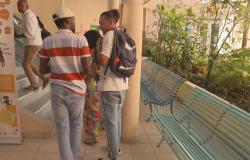
This week, Réunion La 1ère focuses on the theme of the cost of living on the island, through a series of reports and the Sobatkoz program on Thursday. Today, we focus on students, who are among the most precarious groups, and must simultaneously carry out their studies and manage their daily living expenses, with very little income.
It’s not easy to make ends meet when you have to train for a job and at the same time continue to bear daily expenses. Students are on the front line facing the high cost of living in Reunion, even more so when they are not eligible for any scholarships.
Yann Pothin is a student at the Regional Institute of Social Work (IRTS). Far be it from him to fail his year and not graduate. It would be, he said, a waste of effort and sacrifice made to achieve this.
Watch the report from Réunion La 1ère:
Reunion students are bearing the brunt of the high cost of living.
•
©Reunion the 1st
While he lives in Plaine-des-Cafres, he has to juggle each month between two weeks of internship, which he does in the south, and two other weeks of courses, at the IRTS in the East.
“I prefer to stay in the South because it’s easier with people close to me with whom I can have support, since times are difficult. Food is expensive, gas is expensive”he explains, thus justifying the impossibility of finding rent in the East.
During his 18 months of study, the first year, the scholarship was refused. This year, it was able to benefit from that set up by the IRTS in partnership with the Region. That is 756 euros, which are spent mainly on fuel to get to an internship or class, and also to eat or help his grandmother with whom he lives. “I relieve, or see a little clearer and take my head out of the water a littleu”, breathes Yann Pothin.
Before this providential scholarship, last year, he had to rely above all on family solidarity. Without his family, it would have been impossible to study, he confides.
Even though his situation has improved thanks to the scholarship, he is still very careful with his spending, while allowing himself from time to time “such a pleasure“, like buying a drink or a sandwich for lunch.”Before, every cent counts“, he finishes.
Having to constantly think about the budget is also a source of stress and has an impact on learning, notes Yann.
“Kan or has no money or stress, or little concentration has or as much as possible on the lessons, the revisions. Kan or has to think about what or what to eat tomorrow, if or still has the fuel to participate in the course, it causes anxiety and it impacts the training.
Yann Pothin, student at IRTS
It was at midday that we met a group of women, also students at IRTS with a view to obtaining their educational and social support diploma. On the Saint-Benoît seafront, that day they shared a picnic with one of their instructors to celebrate the end of classes in one of their subjects.
•
©Réunion La 1ère
Gwendoline Manieca is a student at IRTS for 15 months, and lives in Le Port. Every month, this young mother, a former home helper now on an apprenticeship contract, has to travel to Saint-Benoît to attend classes, and the other three weeks, she is on an internship elsewhere.
The car is therefore one of its biggest expense items, between maintenance costs and fuel. “The end of the month can be hard, especially when you have unforeseen events.“, sighs the one who earns between 700 and 900 euros per month.
“It’s very complicated. (…) We feel it when we go shopping and we have to sacrifice things to take the most important things to live, and we no longer really have a way to please ourselves “
Gwendoline, student at IRTS
Paola Corré, also a student, expresses the same difficulties. She comes from Le Tampon every day to attend classes at the IRTS in Saint-Benoît. Previously an employee, she had to return to student status, and thus lost income. “To struggle is to have the rent to pay, the bills, the insurance of the car, the house… Newborn on the 13th and half already overdrawn“, she blurted. “Student scholarships are very little for someone who no longer has family support.” continues Paola.
The Institute’s trainers are direct witnesses to this student precariousness. Sylvie Marguerite, who is having lunch today with her learners, regrets that some have to go so far as to abandon their training because they cannot afford the costs.
“We regularly have students who come back to us telling us that life is expensive, that we have to pay for groceries, rent, gasoline… Even if systems exist, we have extreme situations of precariousness, and financially they can no longer make ends meet.”
Sylvie Marguerite, trainer at IRTS
The trainer emphasizes being attentive to the situation of the students, with the aim of ensuring that there are no dropouts. “We try to keep this spirit of support outside of learning times, in the private sphere. Our door remains open so that there are no training interruption situations“, concludes Sylvie Marguerite.
“Sometimes, students don’t have food. In 2024 this is a reality.”
Sylvie Marguerite, trainer at IRTS
•
©Réunion La 1ère
To deal with the problem, the IRTS Student Life service is implementing several actions with partners and associations: delivery of packages with the Mascarene Food Bank, system of solidarity baskets for students to share with their classmates. promotion of foodstuffs, or even computer loans or a solidarity fund.
Of the thousand students welcomed from IRTS, 75% are in a precarious situation according to the Student Life service.
“We try to help them as best we can, by directing them towards existing systems, by organizing actions, or by calling on the network of former students of our establishment to find solutions”
Xavier Poirié, head of the IRTS Student Life service
For Xavier Poirié, head of the Student Life service at IRTS, the precariousness of these students is mainly due to the distance between the Benedictine establishment and their place of residence. “Often, the student lives in the South, in the North, in the West, and he regularly comes to classes at IRTS. This is an additional cost caused by transport and lunchtime meals“, he emphasizes.
The goal of its service: to help these young adults overcome difficulties during their training within the establishment. The training will allow them to access employment once they graduate, and therefore a salary. Because 95% of the approximately 400 students who graduate from IRTS each year find a job afterwards. We still have to make it to the end, despite student precariousness, which is sometimes extreme.





